Ford Focus vs VW T-Roc - Differences and prices compared
Compare performance (280 HP vs 150 HP), boot space and price (27500 £ vs 26400 £ ) at a glance. Find out which car is the better choice for you – Ford Focus or VW T-Roc?
Costs and Efficiency:
Price and efficiency are key factors when choosing a car – and this is often where the real differences emerge.
VW T-Roc has a minimal advantage in terms of price – it starts at 26400 £ , while the Ford Focus costs 27500 £ . That’s a price difference of around 1076 £.
Fuel consumption also shows a difference: Ford Focus manages with 4.90 L and is therefore a bit more efficient than the VW T-Roc with 5.50 L. The difference is about 0.60 L per 100 km.
Engine and Performance:
Power, torque and acceleration are the classic benchmarks for car enthusiasts – and here, some clear differences start to show.
When it comes to engine power, the Ford Focus has a significantly edge – offering 280 HP compared to 150 HP. That’s roughly 130 HP more horsepower.
In acceleration from 0 to 100 km/h, the Ford Focus is decisively quicker – completing the sprint in 5.70 s, while the VW T-Roc takes 8.90 s. That’s about 3.20 s faster.
In terms of top speed, the Ford Focus performs a bit better – reaching 250 km/h, while the VW T-Roc tops out at 212 km/h. The difference is around 38 km/h.
There’s also a difference in torque: Ford Focus pulls convincingly stronger with 420 Nm compared to 250 Nm. That’s about 170 Nm difference.
Space and Everyday Use:
Beyond pure performance, interior space and usability matter most in daily life. This is where you see which car is more practical and versatile.
Both vehicles offer seating for 5 people.
In curb weight, Ford Focus is to a small extent lighter – 1330 kg compared to 1465 kg. The difference is around 135 kg.
In terms of boot space, the VW T-Roc offers slightly more room – 475 L compared to 392 L. That’s a difference of about 83 L.
In maximum load capacity, the Ford Focus performs barely noticeable better – up to 1354 L, which is about 4 L more than the VW T-Roc.
When it comes to payload, Ford Focus slight takes the win – 560 kg compared to 515 kg. That’s a difference of about 45 kg.
Who wins the race in the data check?
The Ford Focus is clearly superior overall in the objective data comparison.
This result only shows which model scores more points on paper – not which of the two cars feels right for you.
Costs and Consumption
View detailed analysis
Engine and Performance
View detailed analysis
Dimensions and Body
View detailed analysis
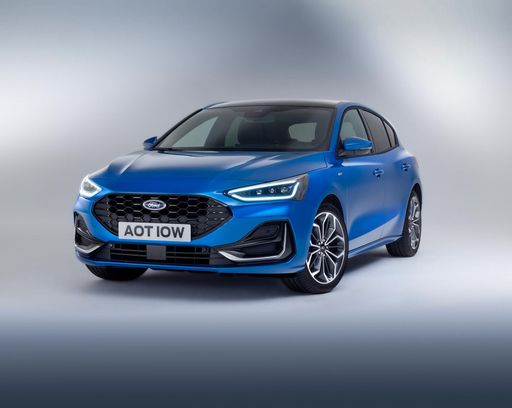
Ford Focus
Ford Focus
The Ford Focus remains a clever all‑rounder that balances sharp handling with everyday comfort, making it a strong choice whether your commute is city streets or country lanes. Its practical cabin and sensible running costs mean you’ll spend more time enjoying the drive and less time worrying about ownership, with a playful streak underfoot that keeps things interesting.
details
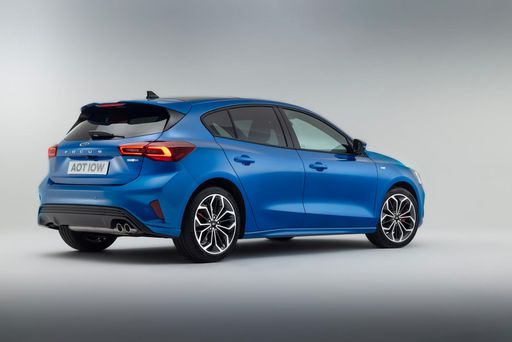
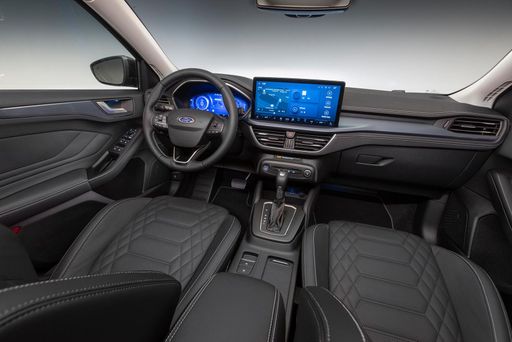
VW T-Roc
The VW T-Roc mixes cheeky, coupe-like styling with the everyday sense and space of an SUV, so it looks fun without sacrificing family sense. It’s a likeable all-rounder with tidy road manners and plenty of personality, ideal if you want a car that’s practical enough for chores but entertaining enough to enjoy.
details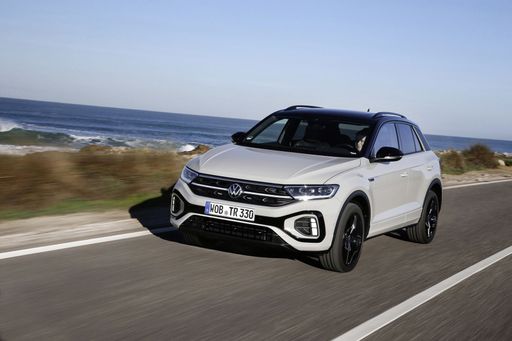
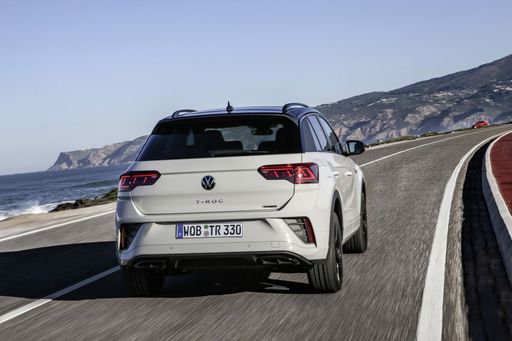
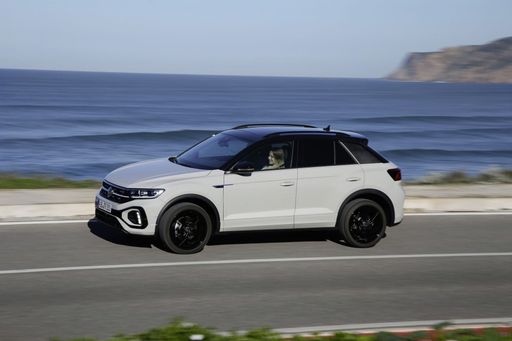
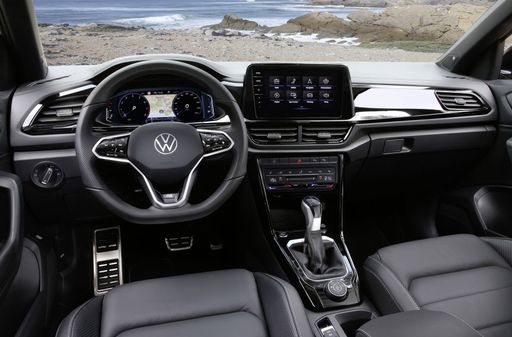
Costs and Consumption |
|
|---|---|
|
Price
27500 - 42700 £
|
Price
26400 - 38600 £
|
|
Consumption L/100km
4.9 - 8 L
|
Consumption L/100km
5.5 - 6.3 L
|
|
Consumption kWh/100km
-
|
Consumption kWh/100km
-
|
|
Electric Range
-
|
Electric Range
-
|
|
Battery Capacity
-
|
Battery Capacity
-
|
|
co2
117 - 183 g/km
|
co2
126 - 143 g/km
|
|
Fuel tank capacity
52 L
|
Fuel tank capacity
50 L
|
Dimensions and Body |
|
|---|---|
|
Body Type
Hatchback
|
Body Type
SUV
|
|
Seats
5
|
Seats
4 - 5
|
|
Doors
5
|
Doors
5
|
|
Curb weight
1330 - 1529 kg
|
Curb weight
1465 - 1539 kg
|
|
Trunk capacity
392 L
|
Trunk capacity
284 - 475 L
|
|
Length
4382 - 4397 mm
|
Length
4373 mm
|
|
Width
1825 - 1844 mm
|
Width
1811 - 1828 mm
|
|
Height
1438 - 1482 mm
|
Height
1573 mm
|
|
Max trunk capacity
1354 L
|
Max trunk capacity
1350 L
|
|
Payload
495 - 560 kg
|
Payload
368 - 515 kg
|
Engine and Performance |
|
|---|---|
|
Engine Type
Petrol MHEV, Diesel, Petrol
|
Engine Type
Petrol, Petrol MHEV
|
|
Transmission
Manuel, Automatic
|
Transmission
Manuel, Automatic
|
|
Transmission Detail
Manual Gearbox, Dual-Clutch Automatic, Automatic Gearbox
|
Transmission Detail
Manual Gearbox, Dual-Clutch Automatic
|
|
Drive Type
Front-Wheel Drive
|
Drive Type
Front-Wheel Drive
|
|
Power HP
115 - 280 HP
|
Power HP
115 - 150 HP
|
|
Acceleration 0-100km/h
5.7 - 11.8 s
|
Acceleration 0-100km/h
8.9 - 12.3 s
|
|
Max Speed
186 - 250 km/h
|
Max Speed
196 - 212 km/h
|
|
Torque
170 - 420 Nm
|
Torque
200 - 250 Nm
|
|
Number of Cylinders
3 - 4
|
Number of Cylinders
3 - 4
|
|
Power kW
85 - 206 kW
|
Power kW
85 - 110 kW
|
|
Engine capacity
999 - 2261 cm3
|
Engine capacity
999 - 1498 cm3
|
General |
|
|---|---|
|
Model Year
2022 - 2024
|
Model Year
2024 - 2025
|
|
CO2 Efficiency Class
D, G
|
CO2 Efficiency Class
E, D
|
|
Brand
Ford
|
Brand
VW
|
What drive types are available for the Ford Focus?
Available configurations include Front-Wheel Drive.




